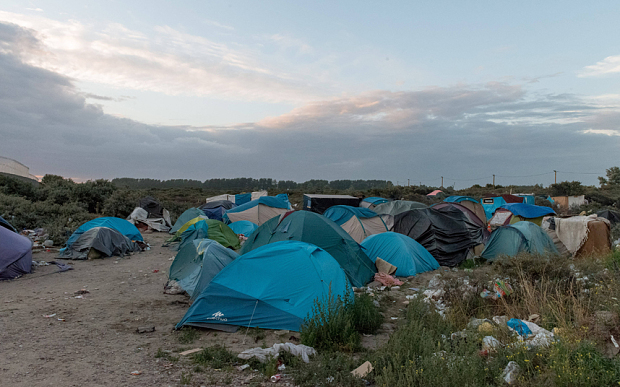Mrs May said that after a meeting with Bernard Cazeneuve, the French interior minster, there will be new moves to repatriate would-be illegal immigrants who currently gather in their thousands in make-shift camps outside the French port.
Britain will also spend a further £7 million improving security at the Eurotunnel at Coquelles, northern France, she said.
Although there were no details on how the repatriation scheme will work, any moves by the French to remove the migrants from France will mark a significant change in policy.
The French authorities have previously been criticised by MPs and some hauliers for simply freeing migrants who have been detained, allowing them to have another chance at making it to Britain.
 Employees of MyFerrylink stage an earlier protest Picture: AFP/Getty Images
Employees of MyFerrylink stage an earlier protest Picture: AFP/Getty Images
Mrs May said: “We have had a constructive meeting with Bernard Cazeneuve and we have agreed on further work to ensure we can return migrants particularly to West Africa, so we can help break the link between people making the perilous journey and thinking they can live in Britain.
“It’s an important step forward.”
Following the Anglo-French summit in London with Mr Cazeneuve and his officials, the two countries will also put more intelligence officers, police and other law enforcement agents on the ground in Calais to crack down on organised criminal gangs involved in people smuggling, she said.
It came as Eurotunnel announced that thousands of migrants stormed the French side of the Channel Tunnel in just one night this week.
 Theresa May, the Home Secretary
Theresa May, the Home Secretary
Eurotunnel’s premises were targeted by 2,000 illegal immigrants overnight on Monday in a bid to reach Britain, a spokesman for the company said.
“There were some 2,000. It was the biggest incursion effort in the past month-and-a-half, definitely,” he added.
It was understood the migrants climbed over fencing at the perimeter of the Coquelles terminal in a bid to board trains inside the huge complex.
In a further development Janette Bell, commercial director at P&O Ferries, was forced to issue a statement reassuring customers that the port of Calais was “safe and open for business”.
She said the company’s services had not been affected by problems at Eurotunnel, adding: “There is no point at which illegal migrants come into contact with our passengers.
“We would like to reassure all tourist and freight customers travelling to the continent that P&O Ferries’ services will make 58 sailings today to or from Calais and that the port is safe.
 A migrant attempts to board a lorry in Calais earlier this summer
A migrant attempts to board a lorry in Calais earlier this summer
“If the situation were to change for any reason, we would of course inform them immediately.”
At the weekend the DFDS passenger ferry operator shut its Dover-Calais route after one of its ships was hit by a distress flare fired during industrial action by ferry workers.
British holidaymakers and freight lorries travelling to France via Calais face further travel chaos later this week after French ferry workers threatened another show of force.
The workers have repeatedly blocked the port as well as access to the Channel Tunnel in a protest over potential job cuts after Eurotunnel agreed to sell its ferry service, MyferryLink, to Danish-owned DFDS.
The French government issued proposals last week to try to end the dispute, including a call for Eurotunnel to establish a charter contract that will save 150 jobs.
But Eric Vercoutre, the leader of the sea workers’ union in Calais, Le Syndicat Maritime Nord, said the government proposals did not go far enough.
He said his union would suspend action until the next meeting with government officials on Thursday.
• The town where migrants wait to cross to Britain
The Foreign Office warned drivers to check with operators before heading for the Channel.
Freight traffic is being staggered on both sides of the crossing leading to local disruption.
Kent police said its emergency traffic plan, Operation Stack, had been enforced because of the large amount of freight traffic heading towards the port of Dover and the Eurotunnel terminal, along with “continued disruption” in Calais.




